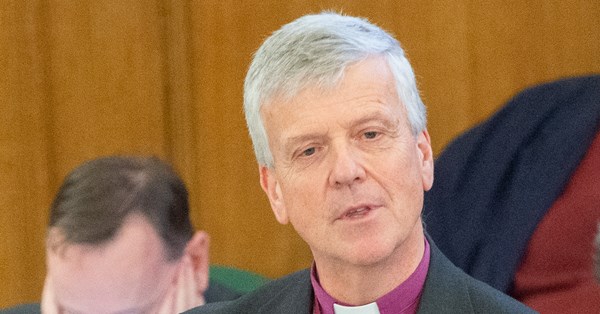“INTEGRITY” has been “trumped by expediency” in the Living in Love and Faith (LLF) process, the Bishop of Guildford, the Rt Revd Andrew Watson, has said.
The way in which changes have been introduced has “significantly dented trust in the House of Bishops”, he writes in a newly published pamphlet.
In the document, published on the diocese of Guildford’s website last week, Bishop Watson suggests that the decision not to use Canon B2 to introduce services of blessing for same-sex couples, but instead to allow their introduction after simple majority votes in the Houses of the General Synod, has caused several problems.
The most significant, he writes, is that “we have bypassed a serious attempt to discern the mind of the Church . . . so dramatically raising the theological and emotional stakes.”
Bishop Watson refers to a paper published by the Church’s Faith and Order Commission, which says that there is no agreement on the nature of the disagreement between those who support changes and those who oppose them. Many, Bishop Watson writes, believe that the disagreement is about “the role of scripture in shaping our theology, liturgy and daily life”.
Earlier this year, the Bishop of Leicester, the Rt Revd Martyn Snow, who is the lead bishop for LLF, published a booklet in which he argued that it was possible to proceed as one Church, even while disagreements continued about the nature of the theological disagreement as well as its implementation (News, 7 March).
Bishop Watson, who, like Bishop Snow, holds a conservative position on issues of sexuality and marriage, argues that an acknowledgement that, for many, the disagreement is of “first- or second-order significance” is an essential step to moving on.
He also writes that any settlement that the Church attempts to reach with opponents of the introduction of blessings for same-sex couples should have “proper legal backing . . . rather than being either discretionary or temporary”.
Bishop Watson asserts that a Canon B2 process rather than approval by a simple majority vote in the General Synod would provide “theological and legal integrity” for the introduction of stand-alone services of blessing.
Canon B2 requires a two-thirds majority in all three Houses of the Synod, and, on the basis of the Synod’s current make-up, it would not clear this hurdle in the Houses of Clergy or Laity.
An umbrella group of Evangelical and traditionalist groups, known as the Alliance, has previously threatened to develop a “de facto ‘parallel Province’” if Canon B2 is not used for the introduction of further changes (News, 28 June 2024).

















